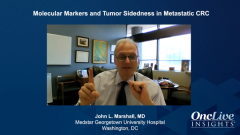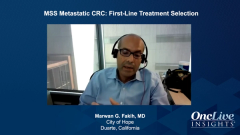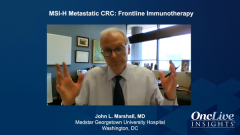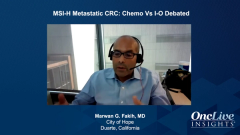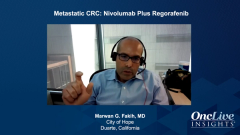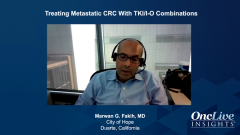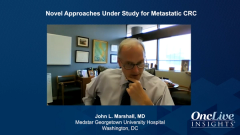
Metastatic CRC: Pembrolizumab Plus Lenvatinib
Implications for using the combination of pembrolizumab and lenvatinib to treat patients with metastatic colorectal cancer based on updated data from the LEAP-005 study.
Episodes in this series

John L. Marshall, MD: Marwan, take us through other TKIs [tyrosine kinase inhibitors]. There are some lenvatinib data with pembrolizumab out there. Can you walk us through that? How did that combination come into play in colon cancer?
Marwan G. Fakih, MD: TheLEAP-005 study was also updated at this ASCO [American Society of Clinical Oncology annual meeting]. This is, again, a study looking at a tyrosine kinase inhibitor plus a PD-1 inhibitor. In this setting, they allowed 2 prior lines of therapy. On the REGONIVO trial, there were patients who had received more than 2 prior lines of therapy. This is a fit population. There were 32 patients on this study. And again, when you look at the overall population, the median progression-free survival was 2.3 months. The overall response rate, however, was 22% here. So it was higher than what was seen on the REGONIVO study. What we don’t have on this study is stratification by liver metastases versus nonliver metastases. Is there really any difference in response or not? The 6-month progression-free survival rate on this study was 31%. It’s apples to oranges, but what you typically expect with TKIs in this setting at 6 months is probably quite a bit lower, usually half of that. But again, we need more data. We need a larger data set than that. I think 32 patients is not enough to tell us one way or another. There are no biomarkers to help us decide which patients benefit. I’m interested in knowing if there is an impact on the outcome by site of metastatic disease here or not, and if we’re seeing differences in outcomes based on liver and nonliver metastases like we’ve seen on REGONIVO.
John L. Marshall, MD: We are in a place where we have learned that anatomy matters. We don’t understand what’s driving the biology, but that phenotype may have some molecular characteristic that makes it more vulnerable. Thanks for reviewing that.
Joleen, what do you think about LEAP-005?
Joleen M. Hubbard, MD: I agree with Marwan. I’d like to see more data. I think it’s too early, with a small number of patients, to say this would affect my practice or I would do it outside of a trial. I think the data are intriguing. Also, lenvatinib is a little different TKI. It targets more things—FGF, RET, and PDGF. It’s a bit different than regorafenib, and therefore, may have more activity. And in pretreated patients, there may be some upregulated resistance mechanisms. I think it’s interesting, but I’ll await more data before I do it outside of a trial.
Transcript Edited for Clarity


